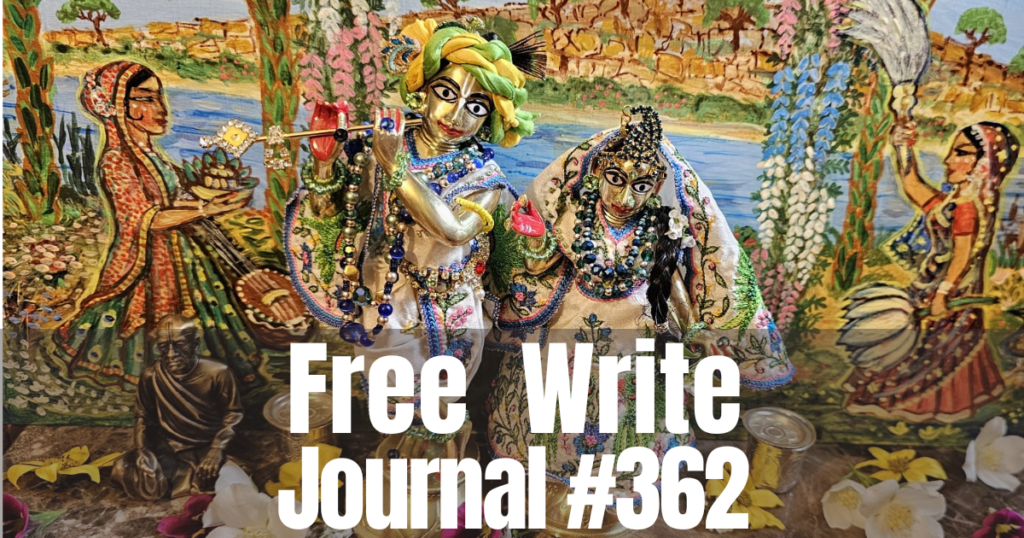

ANNOUNCEMENT
GN Press Needs / Services Available
We need to expand our team of proofreaders as we aim to increase the rate of republication of Satsvarūpa Mahārāja’s books as well as new books that he writes.
This includes a need for fluent bilingual Spanish and English speakers to proofread Spanish translations (we currently have around 20 Spanish translations waiting to be proofread).
Anyone interested in this particular service should contact Manohara dāsa at [email protected]
If you would like to help, please contact Kṛṣṇa-bhajana dāsa at [email protected] or [email protected] and we will find you a service that utilizes your talents.
Dear Śrīla Prabhupāda,
Please accept my humble obeisances at your lotus feet. You are the dearmost person in my life. You are the representative of Kṛṣṇa, and you have saved me from great calamity. Before I met you, I was a lost soul. But you came to me and pulled me out of the well of material suffering. You turned me into a respectable person. Before I met you, I had many sinful habits, like the four sinful activities—illicit sex, meat eating, intoxication and gambling. I was a lost cause. But the first night I attended your class in the storefront on Second Avenue, I tasted bliss, and I felt I had been saved. Chanting in kīrtana with you brought me ecstasy. I was able to give up all my sinful activities in one night, and from then on, I have always tried to be a faithful servitor to you. I became your servant. I became your disciple after one night. Just by meeting you and joining you in kīrtana and listening to your lecture (although I couldn’t understand your accent so well), I became sworn to serve you always.
I have sworn my life to you. I beg you to please always protect me and never kick me away. I always want to be true and faithful to you.
Offering obeisances to you in your presence is a great thrill. One imbibes your holy spirit by being close to you and bowing down with full hands and feet. To be near you and bow down with hands and feet brings one the great pleasure of being a worshiper of the greatest spiritual master. You convey your full blessings to one who sincerely bows down to you and offers you love from the heart. For the devotees who truly surrender to you, you reciprocate with them and bless them, accepting their worship when offered in all sincerity. It is truly bliss to worship you and pledge to surrender to you with one’s life.
Dear Śrīla Prabhupāda, I want to be surrendered soul. Please forgive this fallen soul, who only wants to take shelter at your lotus feet and to never commit any wrong acts again. You are my only savior, and I take shelter in you.
Begging to remain your surrendered disciple,
Satsvarūpa dāsa Goswami
tan-nāma-rūpa-caritādi-sukīrtanānu
smṛtyoḥ krameṇa rasanā-manasī niyojya
tiṣṭhan vraje tad-anurāgi-janānugāmī
kālaṁ nayed akhilam ity upadeśa-sāramThe essence of all advice is that one should utilize one’s full time – twenty-four hours a day – in nicely chanting and remembering the Lord’s divine name, transcendental form, qualities and eternal pastimes, thereby gradually engaging one’s tongue and mind. In this way one should reside in Vraja [Goloka Vṛndāvana-dhāma] and serve Kṛṣṇa under the guidance of devotees. One should follow in the footsteps of the Lord’s beloved devotees, who are deeply attached to His devotional service. (Sri Rupa Gosvami, Upadesamrta 8)
******
The contents of Rupa Gosvami’s verse contain the following points:
******
In Verse 8 of Upadesamrta, Rupa Gosvami prescribes that chanting can be done with the tongue and the mind. The mind is the source of all evil, but if the tongue can be controlled, it can also control the mind. Control of the tongue means always chanting the holy name.
******
Rupa Gosvami says we should not only chant the Nama but also the rasa, the qualities, and the pastimes of Radha and Krsna. This should definitely be done if one wants to progress toward krsna-prema. He should “chant” what he hears from rasika books. If we speak about Krsna according to what Srila Prabhupada has taught, then chanting and devotional service will be easy. The pastimes of Radha and Krsna will automatically appear in our japa; we do not have to think of Them separately when we chant. But if one has worldly desires, then even if one tries to chant Hare Krsna, those material desires will come to mind during the chanting.
******
Krsna has so many rasika names like Radhanatha, Radha-kanta, Rasabihari, and so on. All these rasika names of Krsna are there within the Hare Krsna mantra. Ordinary people take the word “Hare” to mean only the Lord, but rasika devotees know that Hare means Radhika, who attracts Krsna and brings Him to Her favorite pastime places. He is stolen by Radha and also takes Her to places like Radha-kunda. So we should always chant the names of the Hare Krsna mantra with awareness of all these rasika meanings, and then the maha-mantra becomes a rasa ocean.
******
Rupa Gosvami’s verse also advises us to be in Vrndavana when we chant, not in any other place. And if we cannot be there physically, then in our mind we must be there, because outside Vrndavana, the spontaneous remembrance of Radha-Krsna’s pastimes may not come. If we are actually in Vrndavana, then the trees and creepers of places like Seva-kunja, Ter Kadamba, Vamsivata, Radha-kunda—they will all remind us of Krsna’s pastimes.
******
When water is in its liquid state, anything we put into it will easily become wet. But when water becomes ice, it is very hard to enter. Similarly, our concentration should be so thick that material desires cannot act. Unless it is very thick, krsna-prema will not come.
******
Srila Prabhupada wrote to Sivananda December 4, 1968:
“Regarding your first question, ‘Is it offensive to think of Krsna’s pastimes while chanting?’ I think you should know that it is not offensive but rather it is required. One must try for the point when he simply hears Krsna and immediately all of Krsna, His pastimes, His form, His qualities, are in his thoughts. So to be always immersed in thoughts of Krsna, this is our process. When we are full in Krsna then where can there be any chance for maya in us? So this is our duty, to remember Krsna’s pastimes. One who cannot remember Krsna, let him always hear Hare Krsna and then when he has perfected this art, then always he will remember Krsna, His activities, His qualities, etc.”
******
Then to me on April 10, 1969, Srila Prabhupada wrote,
“Regarding [your] question, hearing the vibration of Hare Krsna automatically reminds one of Krsna’s pastimes. So both of them arise simultaneously in the mind when one is sincerely chanting. So you cannot make any distinction between listening to the sound and thinking of the pastimes. But the process is to hear, and then Krsna’s pastimes, form, qualities, etc., will automatically come to mind.”
******
I have not been trying hard enough to chant in a rasika way. I am aware of that process, but somehow I thought that I had to first work very basically on the mechanics of hearing the holy name with my outer ear. I may not be wrong to have been thinking like this because I have been so negligent. And although I have been reading the Tenth Canto and books like Prema-bhakti-candrika, I have not been deliberately trying to mix that reading with my chanting.
Also, I have not been cultivating a desire to reside in Vrndavana when I chant. I need to get out of the material locality and meditate on Vrndavana. I want to chant in Vrndavana.
******
During japa this morning, I stopped between rounds and read a verse of Manah-siksa and then later, tried a verse from Vrndavana-mahimamrta. I was afraid that this would take too long and delay me in making the quota, but it needn’t turn into a long reading session. It requires prayerful reading, that technique of reading a small amount and concentrating on it in prayer.
So I beseech the mind to cooperate as an aspiring devotee, and then I will sprinkle it with drops of vraja-bhava, direct from those who are drowning in it. Here, mind, hear this:
“Within the boundary of Vrndavana forest, O friend, please worship this dark ocean of transcendental nectar which has many playful, glistening waves of eternally expanding amorous pastimes. That is the home of the splendid transcendental fish of Srimati Radharani’s heart and mind that rises with the rising of the moon that is Radharani’s face, that is churned by the wonderful Mandara Mountain of transcendental passion for Radharani, and that brings nectar to the eyes of all the gopis” (Sri Vrndavana-mahimamrta, Sataka 2, text 2).
I’ve given the same Janmastami talk the last two years. I summarize the verses in the Bhagavad-gita, Fourth Chapter where Krsna explains how and why He appears in the material world. And I summarize the KRSNA book chapters leading up to the appearance of Krsna. I think this is a quite appropriate talk to give on Janmastami, but I wondered if I should do something different, new.
I’ve decided to give up the old formula. I want to talk about Krsna appearing in our hearts on Janmastami. I got this idea from the Christian mystic Meister Eckhart. He gave a Christmas Day sermon in which he said, “On this appearance day of Christ, we should have Jesus appear in our hearts.”
How do we do this? How do we observe Janmastami in ISKCON? Well, we fast, we may cook, we may read the KRSNA book together. In the big temples there are great crowds, and abhisekha of the Deity is performed. To observe it strictly, one stays up until midnight and then breaks the fast. And for those devotees who aren’t involved in cooking, they may chant extra rounds. So we might say that simply by observing the standard program Krsna is appearing in our hearts on Janmastami. And this is true.
I observed Janmastami with Srila Prabhupada and many devotees in New Vrndavana in 1972. I remember being packed up in the little temple room late at night. Prabhupada had a devotee reading from the KRSNA book out loud, chapter after chapter after chapter. Devotees were tired from fasting, and many were falling asleep. The sannyasis’ dandas were tilting forward, and some of them touching the ground. Prabhupada noticed and he said, “I see you are getting sleepy. We shall stop this reading.”
I don’t want to concoct something special or different to do on Janmastami, but Meister Eckhart’s sermon fascinates me. It’s as if, in addition to reciting the philosophy on how and why Krsna appears in the world and reading from the KRSNA book and chanting, maybe we should do something introspective to receive Krsna on Janmastami.
I’m a writer, so I like to write down prayers. In recent years I’ve compiled two volumes, My Dear Lord Krsna. Jayadvaita Swami read one volume and said it was “superexcellent.” I tried with words to approach Krsna and enter His presence and talk to Him. Each day I struggled before the blank page and tried to make an encounter with Krsna. And I think in writing those prayers, Krsna helped me.
In 1990 I wrote a book called My Relationship with Lord Krsna. It’s a five-day meditation on the subject. It has chapters like “Recognition of My Relationship with Lord Krsna;” “Krsna is Great, I Am Small;” “My Constitutional Position;” “Speaking to Krsna;” “Turning Toward Krsna.”
I would like to read a couple of statements from this book by Prabhupada because they are relevant to my subject. They were given in lectures in June of 1972 in Los Angeles.
Krsna is within you. As soon as He sees you are very sincere, doing seriously, He will give you all intelligence. Buddhi-yogam dadami tam. But if you are in doubt whether Krsna is person or not? then Krsna will not give you intelligence. That is the difficulty. He does not talk with the nonsense. He talks, but not with the nonsense. If you are above the nonsensical platform by sincere service, then Krsna will talk with you from within. (SB 2.3.20, June 16, 1972)
“Don’t waste a moment even,” Srila Prabhupada said to devotees in Los Angeles in 1972, including the four newly-initiated sannyasis. “
We can understand things as they are if we receive the message of Urukrama, Krsna. Therefore, you should not waste a moment even with nonsense topics. We have got so many books. Either chant Hare Krsna Hare Krsna Krsna Krsna Hare Hare, or read books, discuss amongst yourselves. Don’t waste your time. Simply always praying, give aural reception to the message of Urukrama. Don’t waste a single moment. This should be your life’s policy. (SB 2.3.20-21, June 17, 1972)
So as I have written prayers, you can write prayers today. You can write a prayer from the sastra and prayers in your own voice and it would be a nice meditation. My point is to be introspective to receive the Lord in the heart.
I recommend that we spend some time alone today. Solitude is very helpful for examining your thoughts. The meaning of introspection is to examine one’s thoughts, feelings and impressions. So on this day we should assess our feelings about Krsna. Some people don’t like to be alone. They don’t know what to do with themselves. But if you try writing or praying or chanting attentive japa, or talking to Krsna, or reading, you might find it a very friendly and productive state. And once you are practiced in it, you can do it even in social settings–when the conversation turns too thin, when it turns to prajalpa, finding fault with devotees, you can turn within and think of Krsna.
Krsna appearing in our hearts is a quiet revelation. I’m not saying we will have a sphurti, a direct vision of Radha and Krsna, and They will talk to us and dance. But we will have a certain assurance that They are present in our lives. After all, our hearts are beating and we are breathing and we are conscious only because Krsna is within our hearts. Those devotees who have been initiated are free from karmic reaction, and Krsna is personally handling their situation. We should have faith in this and live in Krsna consciousness.
…. So on Krsna’s Appearance Day we should have Him appear in our heart….On this day we can have a quiet revelation of Krsna in our hearts and offer prayers to Him and surrender.
Thank you very much.
pp. 196-203
You can see Srila Prabhupada is sitting on a highly ornamented vyasasana. He is on a Ratha Yatra cart which has stopped at the end of the parade. The microphone stand is placed before him, and he is leading kirtana playing the gong. Thousands of people are facing him joining the musical chant. Prabhupada is accustomed to this, and he knows what to do. Soon he will give his lecture. He will speak spontaneously, and it will come out coherent and comprehensive, a talk about Krsna, the Supreme Personality of Godhead. Many people in the audience have never heard him before. If they listen carefully, he will open up new concepts to them, that God is a non-material person, and to please Him in devotional service is the highest goal of life. To those who have already heard this, they will become inspired and touched at their core of faith, krsnas tu bhagavan svayam. This person Krsna is the summum bonum, their dear beloved and best friend. Prabhupada is personally carrying Krsna, distributing Him free of charge and directly. His words are the culmination of the Ratha Yatra parade. The pageantry is wonderful, but his words are the most important part of the celebration, his words and the kirtana. This is the Gauidya Vaisnava method of imbibing the supreme truth. Prabhupada is delivering the parampara of the previous acaryas like the six Gosvamis, Lord Caitanya and Krsna Himself. Most people hearing him, even his disciples, don’t appreciate the magnitude of the moment, but it is happening— Krsna is appearing in person on the tongue of Prabhupada. It is a tremendously auspicious occasion.
Here is Prabhupada on a morning walk, wearing his heavy woolen swami-cap, a grey cadar and tan sweater, piece of turtleneck jersey showing. It must have been a chilly morning. His face has so many expressions. He looks sad, tender, compassionate, thoughtful, transcendental in a world of his own. He could switch from these moods from one to another as parts of his self. On a walk, people wanted to be near him, to ask him questions and hear his answers. It was not the same as words he wrote down in print, but the way he spoke them made it very different. He is carrying Krsna in his heart, and he is compassionate to share Him and teach Krsna consciousness to others. That is the main impression I get from this picture. He has wanted to create influence for his Guru Maharaja and for Lord Caitanya. For many years he was all alone, and no one would listen to him. His immediate family did not appreciate him because he did not have much money, and besides, he did not like that burden. Ever since he left home he wanted to preach for his Guru Maharaja, but he was not in a position to do so, and when he was free, his master’s Gaudiya Matha was ruined, and there was no organization to preach for.
But by the time this picture was taken he was at the peak of his influence in the International Society For KRSNA Consciousness, his own branch of his master’s movement. He was very successful, and he had thousands of followers. He looks satisfied, loved but still very humble and in a sense all alone, carrying many disciples. They all loved him but could not possible understand his exalted status. They work hard for him and dedicate their lives for him and for this he is very appreciative and loves them all as his children. But ultimately he is alone, satisfied to see the book distribution, the Radha-Krsna worship, and the bright young faces. But alone with Krsna in his heart.
I don’t know where Prabhupada
was going on the Staten Island
Ferry in the winter of 1967.
Maybe to look at some property
for a possible temple or ashram.
He never went anywhere except on
Krsna’s business. He didn’t take
vacations or take a day off
to entertain himself. He’d
rather stay at home and write
his books and chant on his
beads.
He went out often for speaking
engagements, even if they weren’t
so prestigious, as long as there was
a promised audience.
Sometimes we arranged engagements
where hardly anyone showed
up, and he didn’t get very
angry at us although he was
disappointed. His spiritual master
told him don’t be discouraged
even if no one comes. You
can always preach to the four walls.
And the cockroaches
in the walls.
Once a big politician invited
Prabhupada to see him, and
Prabhupada refused saying the
etiquette was that the man
should come to see him.
We traveled maybe few hours
to get to Ananda Asrama in
upstate New York, Dr. Misra’s
country estate, and had a great
kirtana and lecture by Prabhupada
there.
He went to the place in California where the
hippies went around nude and
took LSD, and he left with
a handful of persons who became
leaders in ISKCON.
Before he came to America he
visited the prisons in India
and gave lectures to the inmates
trying to reform them.
He went to Switzerland once to
trade on the gold market,
but gave it up as ill-advised
after a few days.
He traveled without an assistant
from Montreal to Santa Fe and slipped
and fell on the moving stairway.
A gentleman helped him to
his feet. When he got to
Santa Fe, Govinda Dasi asked
him in distress, “What does Krsna want
us to do?” (They feared the
altitude was too high for his
heart and they had no good
engagements for him). He
replied, “Krsna wants to know
what you want to do.”
He stayed there and found some
interested people to talk to.
He went to Moscow with
two servants and was restricted
to his hotel and one interview
with a professor of Indology.
But Syamasundara found a
young man in the street and
brought him to Prabhupada’s
hotel room where he
imbibed the basics of
Krsna consciousness in two
or three days and spread
it to the whole country.
Once he traveled in a luxury
car all morning from the Paris temple,
stopping for a picnic, and looked at a castle
but it was too expensive
and he didn’t buy it.
He went to the ghetto in
Detroit to look at the Fisher
Mansion and decided he
must have it. At first he asked
the owner to donate it free
but finally took their
offer of about $300,000
which was donated by the
heirs of Ford and Reuther.
He went to Jagannatha Puri but
refused to enter the temple
since the pandas didn’t let
his western disciples enter.
He gave a lecture and chastised
them for their restrictive
policies and proclaimed he
was holding Ratha Yatras
all over the world.
He left his deathbed and made
a final visit to England and
wanted to go to America too,
but the end was near so he
returned to his home, Vrindavana,
and stayed there until he was
taken by Krsna back to Goloka
Vrndavana.
Or did he go somewhere else?
He went wherever Krsna sent
him for His satisfaction and
fulfillment of sankirtana.
I was worried
that when I give my talk on Prabhupada
they might not laugh at the funny parts,
something will get lost in the translation
and I’ll be left pulling a huge horse cart
all alone and I won’t even know
I need their help.
But I’m ready if it happens.
I’ll keep diving into the memories.
I gave Prabhupada a mango every day
because he spoke of them.
He said, “This is love, this is Krsna consciousness.”
I said to him I am feeling hopeful
and this Krsna consciousness seems very strong.
I said I have to go for the weekend to my parents’
home, but not without telling you
because you are my guru and you ought
to approve of my movements or at least know
why I am missing from your sight
for a few days.
Yes, he smiled, that is all right.
And he let me go and come back.
If they don’t laugh, that’s all right.
Maybe it’s not even funny.
Just tell it, what you said and what the Swami said.
I said the buildings don’t frighten me anymore.
Swamiji, I saw a man drunk or maybe crazy in the street
he was directing traffic. That same man
had attended the temple kirtana the night before.
“Oh, he was a madman?” Swamiji said.
He lived in New York
above the noises, anger,
a lotus floating on the water,
plain transcendental goodness he wanted from us—
respect the holy name, no meat or intoxication,
no illicit sex. Just chant with us.
Maybe the devotees here know all this
from Prabhupada-lilamrta.
But I’ll tell it again.
Under the tree at 6 P.M., they can laugh
or listen or look off and
think of their own work.
I will tell and be satisfied.
I will desire that someone
become a pure devotee of my spiritual master.
Prabhupada, I am confident
that you will never leave me. I am also
confident that I will never leave you.
Also, I think no matter where
I start a poem on any morning
it can be genuine meditation on you.
You are going for a morning walk
and I will join you.
Today I returned to the temple after 30 hours
of headache. They accepted me back without a word.
I don’t speak Czech so what is there to say?
I wasn’t up to singing samsara but drifted in it
while another sang. I drifted in memories and feelings,
standing in place, swaying with the rest
to the soft beats of kirtana.
Prabhupada is here.
I was thinking of you
and coming here to write.
The important thing is to write for myself,
to actually think of you and not make a
show only.
This van, plastered with so many pictures
of His Divine Grace, is an insider place.
It is not for the public. They could not understand
when I put up a poster for His Divine Grace in
Harvard Divinity School; a student wrote mocking
graffiti. This is not for them.
I am confident that
you remember me.
You live and I can live with you.
You lift me over the imperfections of my service.
You accept me.
Last night they asked me
“When you missed the first initiation,
what happened so you decided
to take it?”
I said, “I went to the wedding,
Swamij i invited me,
and saw the boys with new red beads
around their necks . . .” As I said it,
I took out my own,
like magic out of the bead bag,
28 years later still shining, I
put them around my neck …
“And they had new names like Jagannatha
instead of Jim and Mukunda instead
of Michael. And the samosas were
so good—cooked by Swamiji—at
that wedding feast that Brahmananda
decided on the spot to become a devotee.”
My Czech farm audience laughed.
I told them I went to you,
Swamiji, and asked to be initiated
at the next ceremony on
Radha’s birthday.
“But you’ll have to be a strict
vegetarian,” you said.
Is that how it happened? At
least those are the events, the
red beads, the feast, Swamiji in
his room . . . I can’t remember more.
He brought me to him.
Now this morning, I cannot bring to me
a disciple as you dragged us.
I don’t have that power.
I sang in mangala-arati,
thinking that “everything”
must be offered to you.
My life is in your care as we
drive off to Germany.
Prabhupada is teaching the world
what it has forgotten. That is, God.
He wrote the purports but people
don’t read them.
He challenged but they didn’t take it.
He walked the beach, in the park, and they could
have come too but were too busy.
Prabhupada made what he taught sound simple—
the body is the outer covering,
there’s a subtle body within that,
and the spirit soul is the real mover.
The supreme soul is Krsna.
Prabhupada had a lot to say against the Mayavadis
to people who didn’t think it was relevant.
They thought Prabhupada was abstract
whereas the problems of the world
are real and multifarious.
But he rejected that and said
the one common disease is material identification
and we all suffer from it.
Just chant Hare Krsna and be cured.
But they laughed. He knew they laughed.
He was disgusted with them
but didn’t give up on them.
A relatively few came to him,
his boys and girls.
On them he lavished affection
gave knowledge to stand strong
and he chastised them too
but that was also instruction, a sharp word
to wake you up to the responsibility
of being Krsna’s representative
in this world.
Prabhupada left his books
and his followers, and he has gone.
We still can’t understand it.
We are only trying to understand
“I’m not this body. Krsna’s God.”
How can we expect to know
where the pure devotee lives now?
Don’t bother about it he said,
it will come in due course. Just
try to serve Krsna. Tell everyone you meet
to please surrender to God.
Prabhupada has left us
plenty to do
to get back to him.
While talking to a roomful of devotees yesterday
I discovered
that Srila Prabhupada was a perfect psychologist.
He assured us that we were fortunate and happy.
We have given up sinful life and
attained Krsna consciousness
so no one should be despondent.
But Prabhupada also made it clear
we are not Vaisnavas
but servants of the Vaisnavas.
A pure devotee is very rare.
He was expert and did it subtly
so no one noticed how—
giving us confidence and humility at the same time.
And what he gave we accepted.
In arguing for Krsna
he’d take any side
to prove the truth, to defeat the Lord’s opponents.
Prabhupada said the devotees
may call the nondevotees
by ornamented names like vimukta-maninas,
“those who think they have become liberated.”
But Krsna is superior and so He tells it plain,
they are mudhas, asses.
Prabhupada did that too, like father and guru.
I’m remembering him
and collecting my appreciations.
He’d prefer to see me battling like him
but if all I can do is discover
some of his expert ways and admire them
he will accept that too as a kind of service.
But if you admire him, you really ought to preach.
This doesn’t have to be printed but‑
Prabhupada is mustard on a sandwich.
Say something you mean.
He talked in a way that could have put him into prison
but Krsna protected him.
His Godbrothers didn’t appreciate. We do.
That’s our qualification.
He loved us and still does.
So I say mustard on a sandwich,
the words just come to mind for something very strong.
But he is also the nicest nectar.
He is the father, the guru
and he is all alone.
We don’t know his mind.
He sits at a low table and we mistakenly
think we know all about him.
He speaks the basic teachings to guests
in the afternoon but we can’t fathom
the compassion that drives him to speak.
And how is it that the inconceivable God of all
has become his close friend?
Surely he talks with Krsna if anyone does
because the Lord wants to give him ideas
for spreading Krsna consciousness.
Maybe Krsna tells him, “Prabhupada,
you already know what to do.”
When they are together is it like
krsna-lila in Vrndavana? I don’t know.
I just know I want to appreciate
his symbols on the page,
his walking stick,
his bare skin when he wears
no kurta. And because of my false ego
I want him to spare me from his heavy frowns,
don’t push my Americanism too far,
don’t try to break my pride or
crush my artistism—in other words
please don’t make me surrender!
He sees what a fool I am.
In a dream
he lets me take off his shoes.
Prabhupada,
I heard you talk this morning while I
shaved my face and bathed and
yes, as I sat on the toilet.
You said that we need milk
to understand God. Not too much,
a pound or half a pound a day.
Milk gives us the brain to understand
transmigration of the soul.
Krsna is very fond of the cows,
as in His picture in the temple.
He is the patron of brahmanas and cows.
I rewound the tape and took it out to play
for Madhu, because I want him to give me
milk every day and fear he may have some
prejudice against it.
He heard Prabhupada’s words
and we agreed.
I said some people speak against milk
purchased from stores. They say it’s supporting
cow slaughter. But Prabhupada took it.
He wanted people to drink milk and then
when they were convinced it was good
they’d stop killing cows.
He said, “Take her blood as milk but don’t kill her.”
“Just that one reason is enough,” said Madhu,
“Prabhupada did it.”
Yes, that one word.
Will the world come to accept him widely?
Will we see it in our lifetime?
They say the Centennial will help
but maybe it’s too early.
ISKCON has to get itself together first
before we can hope to unite the world.
Let’s appreciate everyone’s efforts for Prabhupada,
at least appreciate Satsvarupa
and give him a cup of hot milk daily.
Prabhupada took it—at night with sugar.
I served him milk in a silver cup.
He will always be dear to Krsna
and to intelligent people on this earth.
As Caitanya-caritamrta says,
only those who are intelligent
can practice Krsna consciousness. And
they will love Srila Prabhupada.
I remember one time in Boston,
a devotee said to Prabhupada,
“Whatever I have is yours.”
And Srila Prabhupada replied,
“That I know.”
They were referring to bead bags
but it also refers to the life
a disciple gives to his guru
and the guru expects it.
The guru is surrendered to the Lord
and to his own guru.
We are expected to do nothing less.
Prabhupada was saying, in effect,
“What’s mine is yours and what’s yours is mine,
that I know.
But what else shall you do for Krsna?”
Always asking more,
so that we can be delighted as he is
in pleasing Krsna’s senses.
How to do it?
He says we should work
for the benefit of others.
Whatever you have received from him
you should try to give it to others.
That is what Prabhupada is about—love for Krsna
and compassion for all souls.
Give them Krsna consciousness.
At least try to think of ways to do it
and give it to some,
at least some.
Police crimes, war crimes, rebels’ crimes,
Prabhupada sees through them all.
Everyone is in ignorance.
“These things will go their own way.”
Maya is punishing them,
you can’t interfere.
But you can work to save them.
It’s like the whole population is crushed
under houses in an earthquake
or buried half-alive in a collapsed coal mine.
He sees this all the time, whereas others see
boys and girls enjoying in a town square,
or a businessman eating a steak on the airplane.
He sees
death camps in the suburbs and skyscrapers,
ignorance in all books.
No wonder he looks grave
and his mouth corners turn down.
But he is happy and generous.
He drives his aging body to travel
to spread Krsna consciousness although it’s not easy.
He did the most signficant act of anyone
in the 20th century and
the world has yet to recognize it.
pp. 40-43
“The instruction given in my books is supposed to be personal instruction. When we read the Bhagavad-gita As It Is, it is, understood that we are receiving the personal instruction of Krsna. No physical barrier is there in the case of spiritual affairs” (Letter to Dhrstaketu, Oct. 14, 1973).
When we read Bhagavad-gita, we should not feel bereft because we are not ourselves present on the battlefield with Krsna and Arjuna. Such feelings are due only to material shortcomings. If we are actually enthusiastic to be with Krsna, and if we are receptive to His message, then we can have direct personal contact with Him through His representative. It is simply a question of our submissiveness.
In a similar way, we can enter into the most intimate association with Prabhupada by carefully reading his books. In the intimate solitude of the early-morning hours, Prabhupada would concentrate on delivering his nectarean message to his disciples. By entering into the intimate mood of Prabhupada speaking his books in the early hours, we can have very personal darsana with this greatest of Vaisnavas. And through such association as this, what could be lacking?
******
“Your preaching in New Vrindaban as well as as intensified study of our literatures with seriousness is very much encouraging. Please continue this program with vigor and re-establish the solidity of our movement. From the very beginning I was strongly against the impersonalists, and all my books are stressed on this point. So my oral instructions as well as my books are all at your service. Now you have the GBC. Consult them and get a clear and strong idea; then there will be no disturbance. Disturbance is caused by ignorance; where there is no ignorance, there is no disturbance. (Letter to Hayagriva, September 14, 1970)
Prabhupada wrote this letter shortly after the New Vrindaban Janmastami celebration of 1970. The crisis of faith some devotees experienced at that celebration is described in Srila Prabhupada-lilamrita Volume Four (In Every Town and Village), Chapter 3, (“A Threat to ISKCON”). For some months prior to the New Vrindaban festival, Prabhupada’s disciples in India had been writing letters to their Godbrothers in America, discussing in a relative way Prabhupada’s position as spiritual master. When this contamination spread, Prabhupada awarded the order of sannyasa to those most responsible in order to purify them. These devotees in turn became very repentant, but in a passionate mood, they adopted the extreme and fanatical view that Prabhupada was actually Lord Krsna himself. During the festival at New Vrindaban, these sannyasis spread wild speculations to the effect that Prabhupada had withdrawn his mercy from the devotees because they did not recognize that he was God. They also spread the false propaganda that no devotee in ISKCON could hope to approach the platform of pure devotional service in this lifetime. These ideas produced intense despair and confusion amongst the devotees. Many experienced mental anguish, and some became physically ill. Devotees blooped, and guests left the festival in great disturbance after hearing these views.
Attending the festival were members of the newly formed GBC. I remember an intense, informal meeting to decide a course of emergency action. We realized that the devotees would accept the shelter of an authoritative presentation of the philosophy as given in Prabhupada’s books. But we also realized that we did not actually know the philosophy sufficiently. So we immediately turned to Prabhupada’s books. We read not in an idle or even scholastic way, but rather in the desperate desire to find solutions to the immediate problems at hand.
We studied Lord Krsna’s statement in Bhagavad-gita 3.31 that those who act faithfully in accordance with His injunctions become free from the bondage of fruit of action, and we read the following in Prabhupada’s purport:
An ordinary man with firm faith in the eternal injunctions of the Lord, even though unable to execute such orders, becomes liberated from the laws of karma. In the beginning of Krsna consciousness, one may not fully discharge the instructions of the Lord, but because one is not resentful of this principle and works sincerely without consideration of defeat and hopelessness, he will surely be promoted to the stage of pure Krsna consciousness.
Some of us recalled that Prabhupada had taught that just as Krsna is simultaneously and inconceivably one with and different from His creation, so too are the living entities simultaneously one with and different from Krsna. By finding these and other doctrines in the Bhagavad-gita and the Nectar of Devotion, we acquired the strong, sastric understanding that no one should despair but they rather stay on the spiritual path. And we could cite references to prove that the spiritual master, as the representative of God, is as good as God, but should never be considered to be Krsna Himself. And having thus prepared and fortified ourselves by reading Prabhupada’s books, we were able to offer shelter to the devotees.
In his letter to Hayagriva, Prabhupada expresses his appreciation for studying his books seriously and intensely. He indicates that by doing this, the devotee will be able to combat future attacks by impersonalists and other false propagandists. Prabhupada also indicates that a clear and strong understanding of the philosophy eliminates disturbances. Ocf course, living within this material world, the devotees will always meet with attempts to disturb their community, and false philosophies will from time to time arise from within. But those in knowledge will not be tricked by false interpretations of the Vedic literature.
Prabhupada’s books are clear; a learned devotee knows their basic conclusions and can defend himself by reference to many conclusive texts and passages. One who reads Prabhupada’s books regularly and carefully will know the basic siddhanta and will be able to very clearly spot deviant and concocted attempts to screw out false meanings.
Why I write:
For B., a non-literary worker
with strong, grubby hands,
who clutches my book.
He has read, “One must follow
the order of the guru.”
It pains him to come
and admit he’s on the slide.
For Nrsimha dasi, and
her husband Sarnga,
who are leaving my zone
for an easier way.
“But by the potency of your books
we feel we are with you.”
For Annie Lennox,
who read without stopping,
Life with the Perfect Master.
For a drug addict in Amsterdam
who is desperate to find Letters from Srila Prabhupada,
which he thinks can cure him
by awakening his spiritual life.
And for the people who will come
in a hundred years from now.
For my purification
and in hopes Srila Prabhupada will be pleased.
For Mrs. Murphy,
who likes to read Krsna conscious poems.
For Steve Leonard’s mother,
who thought devotees were devils
until she read Back to Godhead and changed her mind.
For a small black lady in a Manhattan grocery
who said, “I read about the Swami!
He was so brave!”
For Prabhupada’s disciples who hardly knew him
and who appreciate the written-down memory.
And for his long-time leaders,
like Paramananda, who read Lilamrta
with a headache,
but felt it as ecstatic bliss.
For the Bombay life members
who want everything on Prabhupada.
For the Africans, who read carefully,
and pass the book on to a friend.
For Brahmananda, in hopes that another book
may move him to write me another encouraging letter
which drives me on.
For Acaryadeva, the writing acarya,
just so that I don’t give up completely
before his superior output.
I write for purification
and for giving evidence that a lifetime can be spent
praising Srila Prabhupada in many books,
so that followers can know his way
even after those who knew him go to join him.
Prabhupada, I write to fulfill my own ambitions,
but you have saved me;
I have placed my effort at your lotus feet.
Please accept me
as a small bird singing
in the treetops of your spiritual forest.
Let me catch sight of you now and then.
Let me know
if it is right what I am doing
or tell me clearly, “No!”
Please direct me,
for you must be my guide,
for you I write,
to please you.
Srila Prabhupada
Because the murti is somehow him,
therefore it is absolutely him.
And any worshiper has the right
to dress, garland, and feed him.
All are chosen servants now —if
you will receive him with care, he
will stay in your home,
giving purpose to a life.
Some nights I surrender,
and he knows, smiles.
I can touch him
and bow down.
One brother said, “I realized
Prabhupada was my only friend.”
I lectured to him, “No, appreciate others.
You are not alone with only him.”
Now I realize how he was right:
when all else fails, Prabhupada doesn’t.
When I was tired of the world,
and no one understood,
I appealed to co-
workers, “Let us
always stay
together.” But
they joked in
reply:
“Is there a threat if we
don’t?” “How about a
two-year contract?”
Both are true in
Prabhupada —he is
keeping us together,
and he is keeping
me together. This
murti is nice.
Lord Jagannatha
Who hears and sees
our foibles, the deadness, our
solitary joy,
who consents to be carried—my
Lord Jagannatha.
To hold His weighty form, to dress
Him in fine clothes, to glimpse into
His eyes
is the constant rhythm of days and
nights; when LJ rises, I rise
when LJ rests, then so do I,
and His food is my diet.
Crossing past the border guards,
“A small art doll, some Indian
statues”—
they don’t know they are seeing God.
Lord of the universe,
Jagannatha Svami,
please accept our fresh water,
please reside in our hearts.
Spread Your rays
throughout the world, or
all is nothing.
Lord Balarama
I do not know You
well, Lord Balarama,
but in this
world, whom do I
know?
At least to me You are the Supreme
Unknown.
I appreciate You
more than anyone else I
meet. Like the people on
this airplane, though they
move, talk, emote,
they have no signs of higher life,
but You have playful, silent, majesty.
Though my devotion unto You
is like an almost-dead battery,
I rejoice to see You anywhere,
while I reject vivacious femmes fatales.
Bright-white, red-
mouthed Godhead, I
aspire to be Your
worshiper.
O Supreme Unknown,
kindly be more visible unto me.
Nrsimhadeva
I’ve seen You for many years,
wherever we go.
When I pray, I don’t know
whether to turn
to You or Prahlada.
I think, “I’m like him, small.” Or,
“I want to be like him, faithful,
transcendental,
so let me pray to him.”
Yet for shelter he prays to You.
Wherever we go,
we should remember You
when we are afraid.
But another fear
is if You don’t appear,
what will that mean?
I am no Prahlada. Why should You
rescue me from a jam that I deserve?
Yet wherever we go,
we worship You,
and it’s not just official;
You are in our hearts,
within and without,
on every temple wall,
and the demons are attacking,
like in Baltimore with shotguns,
but by Your grace we were unharmed and
the culprits were arrested.
You are the protector of the altar, the
Deity of the Deities,
the expansion of Lord Krsna to
protect us all.
My prayer is to remember You and
to be unafraid.
Let happen what You will, we
pray to not forget You.
Yato yato yami
tato nrsimha.
When will the day come when I will
always personally remember Srila
Prabhupada?
Will the day ever come when I will go to him again
with a heart full of submissive desire
to be his servant? Will I ever attain to
love of his lotus feet?
I know that I will always serve my master,
Srila Prabhupada, in the company of my Godbrothers
and other future followers of Prabhupada. At least in
this lifetime I will always
offer obeisances before the murti of Srila Prabhupada, and
somehow I will engage with his devotees in the kirtana and
preaching of the sankirtana movement.
But will I ever attain to the pleasures known to the
surrendered servants of Prabhupada?
When will I suffer on his account and feel his smiling
pleasure?
When will I lose all envy toward the glorious activities of great
devotees of Srila Prabhupada?
When will I do his bidding with a happy heart?
When will I be able to take part in the Mayapura festival, feeling
transcendental bliss in the company
of devotees?
Only then will I be able to see the Deity of Radha-
Krsna with love-anointed eyes.
Only then will I be able to chant japa hour after hour in
prayerful concentration.
Will these things ever be possible in this lifetime? Am I too
polluted by my many years of sinful life and past lives of sin?
When will I realize that the personal darsana
of Prabhupada is available most intimately to the preacher
who boldly goes out on Prabhupada’s account and preaches
hari-nama?
I am wondering and lamenting about these things while trying
to remember Srila Prabhupada.
Bhūrijana Prabhu sent me a recorded letter which I played on a computer. The volume was very low, but I could make out the majority of the words. He was speaking from Australia. He told me of a new one-day workshop program they have instituted there called “Alone with Kṛṣṇa / Together with Kṛṣṇa’s Devotees.” First, they somehow separate the devotees so that each one is alone, all by himself/herself. Then for two hours each devotee carries out a spiritual practice focused on Kṛṣṇa. They either chant, or read, or write, or pray—doing something that is focused on Kṛṣṇa and not being distracted by any other persons or bureaucratic activity or business practice. The devotees who took part in this in the cities of Perth, Melbourne and Christchurch reported that it was a profound experience.
After the two hours of solitary practice, the devotees gathered together and shared their realizations. I think Bhūrijana implied that they would hold congregational chanting and other shared activities like that.
(In the future I can respond to Bhūrijana’s letter and ask him how he prepares his groups, especially how the devotees can enter two hours of solitude and prevent distractions and learn how to overcome the inevitable ones.)
I have practice in this myself without asking Bhūrijana. Where I sit in Stuyvesant Falls and write, there are many outside noises from trucks, motorcycles, passing people, the folks shouting from their next-door outdoor pool, and the distractions from within our own āśrama.
But in the solitary two hours, how to go deeper in focus on Rādhā-Kṛṣṇa and all Their liberated pāriṣads, and Lord Caitanya and His associates? Being well associated with the līlās and philosophies of those great personalities is one of the best ways. When by repeated readings and hearings among sadhus and advanced devotees you become familiar (in the best sense) with Kṛṣṇa consciousness and the elevated persons who associate with Kṛṣṇa, you will be a veritable touchstone and can turn to gold whoever you meet.
Do I know how to go deeper into Kṛṣṇa consciousness by prayer? Mostly I do it by writing, as in the letters I write to Prabhupāda and Kṛṣṇa. I see them before me as I pen my epistles to them.
(I remember the days and months in 1977 when the devotees in ISKCON prayed, mostly to themselves, “My dear Lord Kṛṣṇa, please cure Śrīla Prabhupāda.” And much earlier than 1977, back in 1967 when Prabhupāda had a stroke, he personally had us also praying for him. The prayer was something like, “My dear Lord Kṛṣṇa, please save Swāmījī.” And then the line I remember most: “He has not finished his work.” In those days we were praying most earnestly from the heart. He even said about his 1967 stroke that the devotees staying up all night, as they did in San Francisco, and praying constantly for Prabhupāda, was what enabled him to survive.)
When there is a cause for praying, an immediate danger, or a need for an earnest plea, then our prayers are more ignited. We should learn how to pray to Kṛṣṇa, Rādhārāṇī, Lord Caitanya, Prabhupāda and the other great souls, even in the time when everything seems peaceful. Not that we call out to the Lord only when we have an emergency need for Him. We are always in an emergency need.
Śrīla Prabhupāda says the Indian people have lost their culture and their money.
“So I thought, ‘America has enough material goods. Now they are in a period of renunciation.’”
He says fifty percent of the people he recruits are among the disappointed. “I have come to save them.”
The reporter refers to K.C. as “oriental.” Prabhupāda says, “It is not oriental.” He claims it is for all. “By the evolutionary process, they come to the human form of life. Then he has to decide whether he wants to go higher or lower. Kṛṣṇa allows him.
He goes through changing bodies.
dehino ’smin yathā dehe
kaumāraṁ yauvanaṁ jarā
tathā dehāntara-prāptir
dhīras tatra na muhyati
As the embodied soul continuously passes, in this body, from boyhood to youth to old age, the soul similarly passes into another body at death. A sober person is not bewildered by such a change. (Bg. 2.13)
Srila Prabhupada:
“At the present, most people don’t know that there is a next life and transmigration.
“God is independent. In the human form of life, we can decide. We have a chance.
“In spiritual life, we can go back to Godhead.
“We should stop the material way of life—or we have to return to the cycle of birth and death.
“We should culminate in spiritual life.”
The reporter asks, “Why do you think your Western movement has become successful?”
Prabhupāda says, “Because they have intelligence.”
The reporter says something about the West has philosophy, but they don’t have ….
Prabhupāda refers to the backwardness of India. He said the World’s Fair in India was displaying the bicycle as their achievement, whereas the United States was showing the jet plane. “They want the swamis, but the swamis who come to them are cheating them, and not a single devotee has come from their efforts. What is needed is a balance of exchange. India is begging, but they should give.”
“What is the relevance of the Kṛṣṇa consciousness movement?”
Prabhupāda says, “You are part and parcel of Kṛṣṇa. If you realize your spiritual position, you will be jolly.”
Prabhupāda says India has lost Pakistan. It was the manipulation of the British. Gandhi wanted to keep India and Pakistan as one, but Nehru, under the influence of the British, took advantage of the split nations.
pp. 59-63
His face turned out to where he saw no land,
but endless moving hills beneath the sky.
Below the deck, in simple saffron dress,
occasionally he spoke with the captain and his wife,
respectable figures who saw him as a traveling saint.
Not a recluse, he cooked kichari and shared it
and talked about Krsna with the ordinary seamen.
The Bay of Bengal was like the ocean of birth and death.
He was alone with his inner thoughts,
reading the poem of Krsna das Kaviraj,
at which the metal bulkheads fell away
and he beheld the fair sight
of Lord Chaitanya singing and dancing.
The sea was a bridge of time separating him;
it was a huge deep for a tiny soul afloat,
but endurable by His will.
The traveling was rough
but sheltered by the Lord
—at sea and yet beyond.
His mission was underway,
despite the injunction against swamis crossing.
On Janmastami and on his own (69th) birthday
he refused to be daunted
by the vast energies of water and sky.
He held to his purpose.
The sea was his route, the pathway to his service,
and not to be begrudged.
Deep down the ship prowed,
then rose high, mounting a swelling wave
in a sea-sick rhythm and roll.
In the hold, in a small, cramped cabin,
sitting up or lying down,
there was no comfort
from the sea-tossed roll and pitch as rain poured down on the
Bay of Bengal.
More rain on the Red Sea.
sudden pains in his chest
made him think he would die.
Were Scindia’s agents right,
that he would die at sea?
What is the pain of a pure devotee?
Only he and Krsna knew
what he was willing to do
to serve his Lord in any condition.
If we like we can ask,
“Why was Haridas Thakur beaten?
Why were the Pandavas exiled and harassed?
Why Prahlad tortured by his father?
Why Rama banished? Christ crucified?”
But we cannot demand the answers.
The Lord unfolds His plans
as He pleases,
and the devotee knows
it is best for all.
Prahlad never doubted:
“If God is almighty and just,
why am I, a devotee, being tortured?”
In confronting the demon,
he did not suffer,
but remembered Krsna
and attained the Lord’s abode.
Prabhupada tolerated
two attacks in two days.
But if it comes again,
I will not survive.
The rains and winds persisted.
On the night of the second day
Prabhupada had a dream;
Lord Krsna in His many forms
was rowing a boat
and encouraging him along.
Lord Matsya, who saved the Vedas from the flood,
waved him on. To protect the Vedas
from the ocean of vices,
Prabhupada must reach the West
and print and distribute his books.
The West was drowning in sins,
and Indian gurus were drowning
the Vedic message
in a sea of bogus speculation.
Come Prabhupada!
You can cross this sea—
the Lord is here!
Lord Kurma of the nectar-churning lila
urged him on to America
to churn the sankirtan-amrta.
Mohini Murti stole the nectar
in favor of the devas,
but if Prabhupada could reach his goal
he would give immortal quaffs of hari-nama
to one and all.
Therefore the Lord was blessing him.
As the moon and gods came forth
from the churning of Mandara Hill,
so during the friction between demons and devotees,
Srila Prabhupada appeared.
And in his hour of attacks at sea,
he beheld the Lord in His many forms.
Come Prabhupada!
You can cross this sea—
the Lord is dear!
Lord Nara Hari’s divine advent
is to kill the miscreants,
and He encouraged Prabhupada
with His fierce demeanor,
which vanquishes the demons’ false dominion
and assures the followers of Prahlad.
The enemies would not touch
a hair on Prabhupada’s head,
but he would kill them all
with the healing, cleansing weapon of the Holy Name.
False threats and illusions
cannot sway the Lord’s devotees,
but Prabhupada must come at once
because until now
the sons of demons
have never met the teachings of Prahlad
or known the protection of Nrsimhadeva.
As sons of demons they have only suffered,
sometimes longing for another world.
Come Prabhupada!
You can cross this sea—
with the Lord there is no fear!
Balarama and Krsna also assured,
“Come along.”
They appeared too in a most delightful way,
running and frolicking in the forests of Vraja—
the all-attractive Lord and His brother,
who deliver the most fallen as Gaura and Nitai.
Let the Americans also share this nectar—
Krsna is not “the Hindu god.”
The Americans will gladly embrace Him—
Krsna with flute
and Balarama with plow.
The Westerners can re-learn to love Them,
since all are eternal spiritual souls,
servants of Krsna and Rama.
Come Prabhupada!
You can cross this sea—
the Lord is here!
Srila Prabhupada. you will cross this sea,
because the Lord desires.
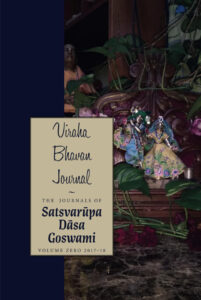
Viraha Bhavan Journal (2017–2018) was written by Satsvarūpa Mahārāja following a brief hiatus in writing activity, and was originally intended to be volume 1 in a series of published journals. However, following its completion and publication, Mahārāja again stopped writing books, subsequently focusing only on what became his current online journal, which began in August of 2018.
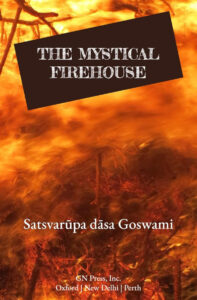
At first, I took it hard that I would have to live surrounded by the firemen, and without my own solitude. After all, for decades I had lived in my own house with my own books and my own friends. I was also now a crippled person who couldn’t walk, living among men who did active duties. But when Baladeva explained it to me, how it was not so bad living continually with other firemen and living in the firehouse with its limited facilities, I came to partially accept it and to accept the other men. I came to accept my new situation. I would live continually in the firehouse and mostly not go outside. I would not lead such a solitary life but associate with the other firemen.
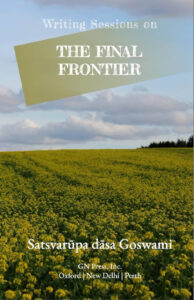
Let me write sweet prose.
Let me write not for my own benefit
but for the pleasure of Their Lordships.
Let me please Kṛṣṇa,
that’s my only wish.
May Kṛṣṇa be pleased with me,
that’s my only hope and desire.
May Kṛṣṇa give me His blessings:
Kṛṣṇa Kṛṣṇa Kṛṣṇa Kṛṣṇa Kṛṣṇa he
Rāma Rāghava Rāma Rāghava
Rāma Rāghava rakṣa mām.
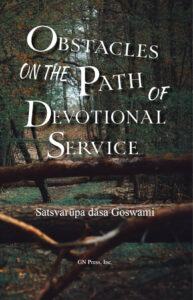
You mentioned that your pathway has become filled with stumbling blocks, but there are no stumbling blocks. I can kick out all those stumbling blocks immediately, provided you accept my guidance. With one stroke of my kick, I can kick out all stumbling blocks. —Letter by Śrīla Prabhupāda, December 9, 1972.
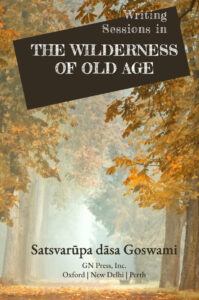
The Writing Sessions are my heart and soul. I’m trying my best to keep up with them. I am working with a few devotees, and they are far ahead of me. I wander in the wilderness of old age. I make my Writing Sessions as best I can. Every day I try to come up with a new subject. Today I am thinking of my parents. But I don’t think of them deeply. They are long gone from my life. Śrīla Prabhupāda wrote a poem when he was a sannyāsī, and he said now all my friends and relatives are gone. They are just a list of names now. I am like that too. I am a sannyāsī with a few friends. I love the books of Śrīla Prabhupāda. I try to keep up with them. I read as much as I can and then listen to his bhajanas.
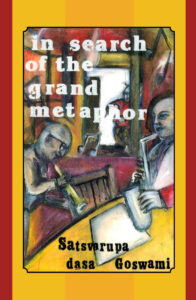
The metaphor is song. Explain it. Yes, particulars may not seem interesting or profound to readers who want structured books.
Wait a minute. Don’t pander to readers or concepts of Art. But Kṛṣṇa conscious criteria are important and must be followed. So, if your little splayed-out life-thoughts are all Kṛṣṇa conscious, then it’s no problem.
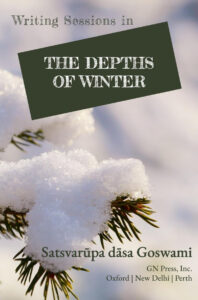
I am near the end of my days. But I do like the company of like-minded souls, especially those who are Kṛṣṇa conscious. Yes! I am prone to Kṛṣṇa consciousness. I have been a disciple of Bhaktivedanta Swami Prabhupāda for maybe almost sixty years. Sometimes I fail him. But I always bounce back and fall at his feet. It is a terrible thing that I sometimes do not have the highest love for him. It is a terrible thing. Actually, however, I never fall away from him. He always comes and catches me and brings me back to his loving arms.

This edition of Satsvarūpa dāsa Goswami’s 1996 timed book, Upstate: Room to Write, is published as part of a legacy project to restore Satsvarūpa Mahārāja’s writings to ‘in print’ status and make them globally available for current and future readers.
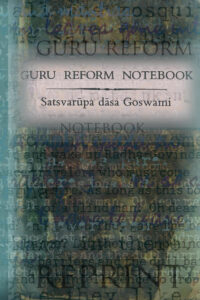
A factual record of the reform and change in ISKCON guru system of mid ’80s.
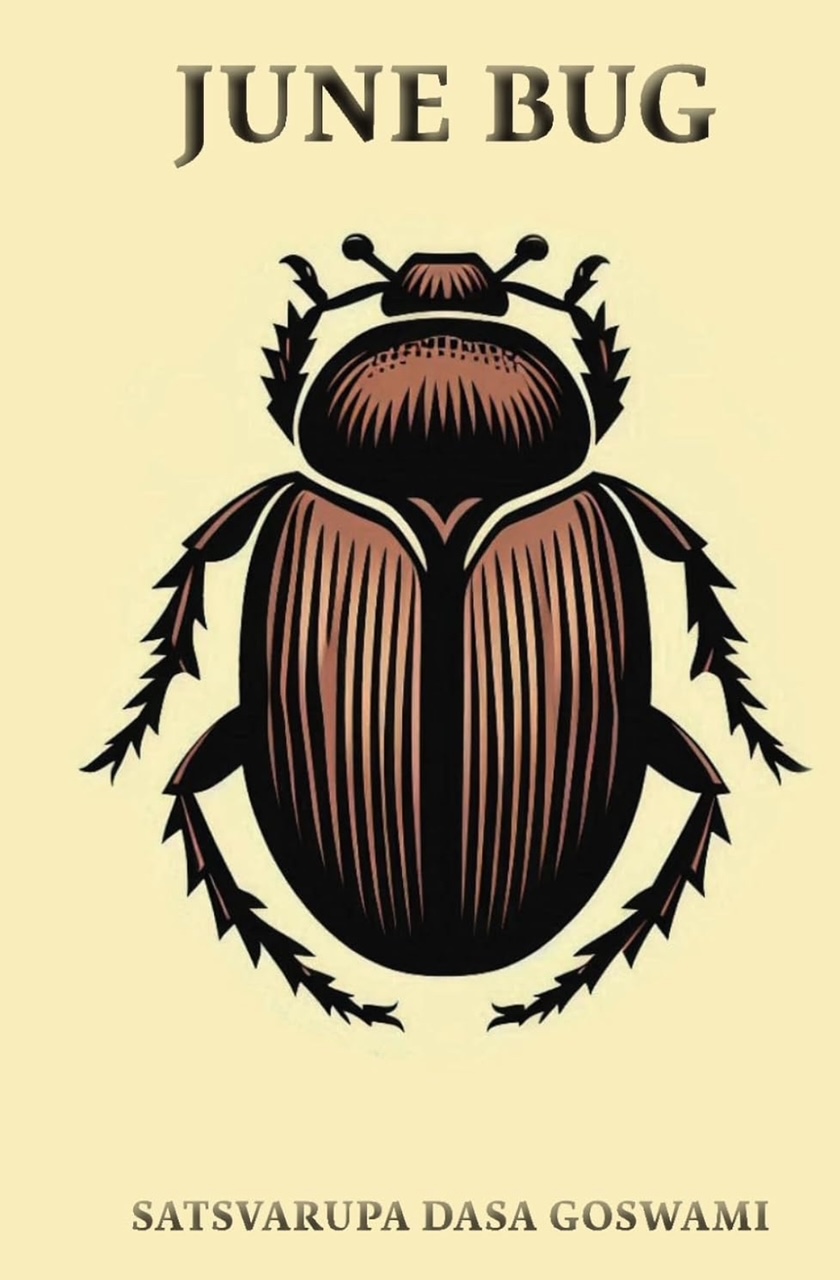
Readers will find, in the Appendix of this book, scans of a cover letter written by Satsvarūpa Mahārāja to the GN Press typist at the time, along with some of the original handwritten pages of June Bug. Together, these help to illustrate the process used by Mahārāja when writing his books during this period. These were timed books, in the sense that a distinct time period was allotted for the writing, during SDG’s travels as a visiting sannyāsī
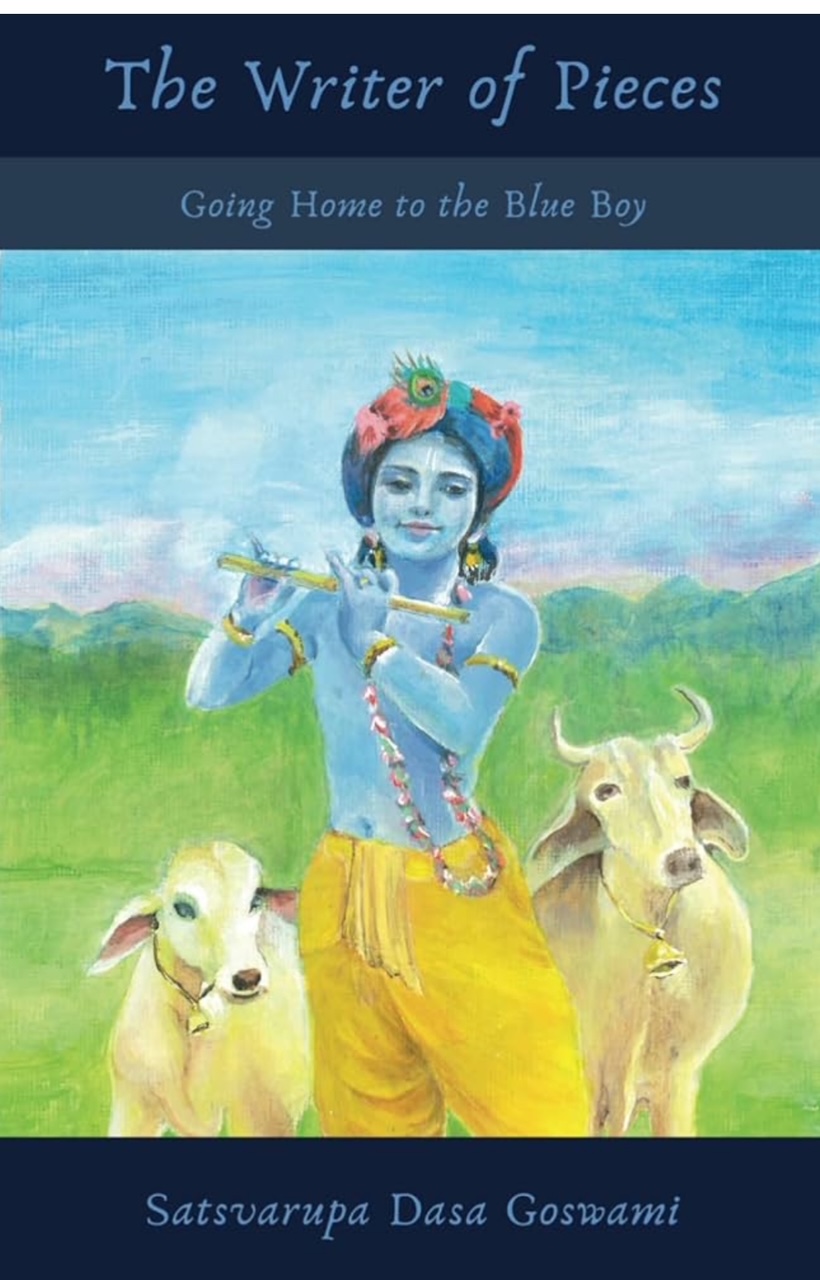
Don’t take my pieces away from me. I need them dearly. My pieces are my prayers to Kṛṣṇa. He wants me to have them, this is my way to love Him. Never take my pieces away.
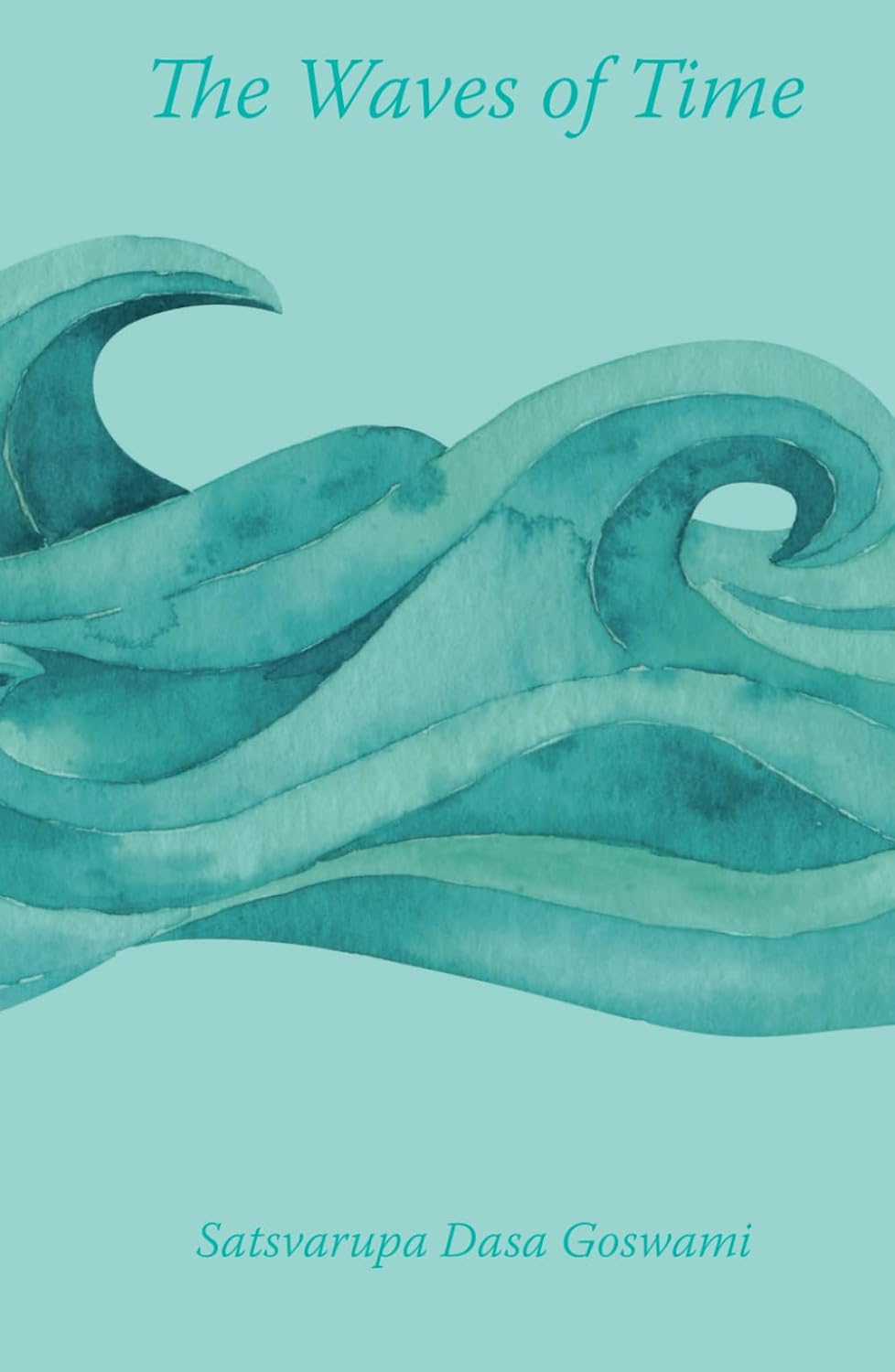
Many planks and sticks, unable to stay together, are carried away by the force of a river’s waves. Similarly, although we are intimately related with friends and family members, we are unable to stay together because of our varied past deeds and the waves of time.

To Śrīla Prabhupāda, who encouraged his devotees (including me) To write articles and books about Kṛṣṇa Consciousness.
I wrote him personally and asked if it was alright for his disciples to write books, Since he, our spiritual master, was already doing that. He wrote back and said that it was certainly alright For us to produce books.

I have a personal story to tell. It is a about a time (January–July 1974) I spent as a personal servant and secretary of my spiritual master, His Divine Grace A.C. Bhaktivedanta Swami Prabhupäda, founder-äcärya of the International Society for Krishna Consciousness. Although I have written extensively about Çréla Prabhupäda, I’ve hesitated to give this account, for fear it would expose me as a poor disciple. But now I’m going ahead, confident that the truth will purify both my readers and myself.

First published by The Gītā-nāgarī Press/GN Press in serialized form in the magazine Among Friends between 1996 and 2001, Best Use of a Bad Bargain is collected here for the first time in this new edition. This volume also contains essays written by Satsvarūpa dāsa Goswami for the occasional periodical, Hope This Meets You in Good Health, between 1994 and 2002, published by the ISKCON Health and Welfare Ministry.

This book has two purposes: to arouse our transcendental feelings of separation from a great personality, Śrīla Prabhupāda, and to encourage all sincere seekers of the Absolute Truth to go forward like an army under the banner of His Divine Grace A.C. Bhaktivedanta Swami Prabhupāda and the Kṛṣṇa consciousness movement.

A single volume collection of the Nimai novels.

Śrīla Prabhupāda was in the disciplic succession from the Brahmā-Mādhva-Gauḍīya sampradāya, the Vaiṣṇavas who advocate pure devotion to God and who understand Kṛṣṇa as the Supreme Personality of Godhead. He always described himself as simply a messenger who carried the paramparā teachings of his spiritual master and Lord Kṛṣṇa.

Dear Srila Prabhupada,
Please accept this or it’s worse than useless.
You have given me spiritual life
and so my time is yours.
You want me to be happy in Krishna consciousness
You want me to spread Krishna consciousness,

This collection of Satsvarūpa dāsa Goswami’s writings is comprised of essays that were originally published in Back to Godhead magazine between 1966 and 1978, and compiled in 1979 by Gita Nagari Press as the volume A Handbook for Kṛṣṇa Consciousness.

This second volume of Satsvarūpa dāsa Goswami’s Back to Godhead essays encompasses the last 11 years of his 20-year tenure as Editor-in-Chief of Back to Godhead magazine. The essays in this book consist mostly of SDG’s ‘Notes from the Editor’ column, which was typically featured towards the end of each issue starting in 1978 and running until Mahārāja retired from his duties as editor in 1989.

This collection of Satsvarupa dasa Goswami’s writings is comprised of essays that were originally published in Back to Godhead magazine between 1991 and 2002, picking up where Volume 2 leaves off. The volume is supplemented by essays about devotional service from issues of Satsvarupa dasa Goswami’s magazine, Among Friends, published in the 1990s.

“This is a different kind of book, written in my old age, observing Kṛṣṇa consciousness and assessing myself. I believe it fits under the category of ‘Literature in pursuance of the Vedic version.’ It is autobiography, from a Western-raised man, who has been transformed into a devotee of Kṛṣṇa by Śrīla Prabhupāda.”
 The Best I Could Do
The Best I Could DoI want to study this evolution of my art, my writing. I want to see what changed from the book In Search of the Grand Metaphor to the next book, The Last Days of the Year.
 a Hare Krishna Man
a Hare Krishna ManIt’s world enlightenment day
And devotees are giving out books
By milk of kindness, read one page
And your life can become perfect.
 Calling Out to Srila Prabhupada: Poems and Prayers
Calling Out to Srila Prabhupada: Poems and PrayersO Prabhupāda, whose purports are wonderfully clear, having been gathered from what was taught by the previous ācāryas and made all new; O Prabhupāda, who is always sober to expose the material illusion and blissful in knowledge of Kṛṣṇa, may we carefully read your Bhaktivedanta purports.

I use free-writing in my devotional service as part of my sādhana. It is a way for me to enter those realms of myself where only honesty matters; free-writing enables me to reach deeper levels of realization by my repeated attempt to “tell the truth quickly.” Free-writing takes me past polished prose. It takes me past literary effect. It takes me past the need to present something and allows me to just get down and say it. From the viewpoint of a writer, this dropping of all pretense is desirable.
 Geaglum Free Write
Geaglum Free WriteThis edition of Satsvarūpa dāsa Goswami’s 1996 timed book, Geaglum Free Write Diary, is published as part of a legacy project to restore Satsvarūpa Mahārāja’s writings to ‘in print’ status and make them globally available for current and future readers.